Feather plucking, a behavior that can cause distress to both birds and their owners, is a concern many avian enthusiasts face. Witnessing our feathered friends engage in self-destructive plucking leaves us searching for answers, hoping to provide relief and restore their well-being.
In this enlightening journey, we delve into the depths of avian behavior, exploring effective strategies to end feather plucking. So, join us as we unravel the secrets and discover how to stop a bird from plucking its feathers.
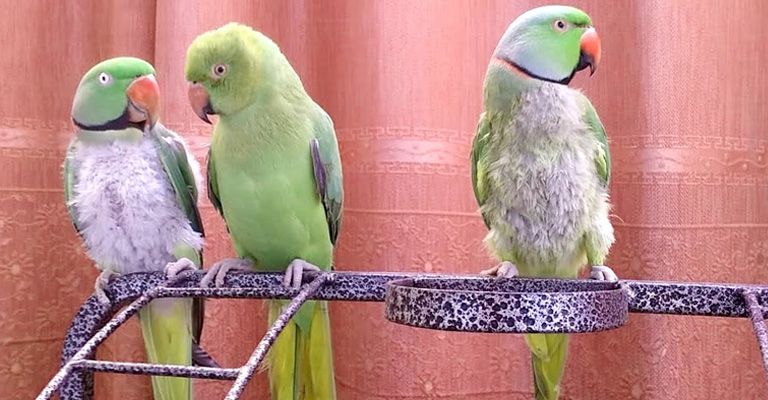
How to Stop a Bird From Plucking Its Feathers?
Feather plucking in birds can be a distressing and challenging issue to address. While there is no one-size-fits-all solution, taking a comprehensive approach and addressing potential underlying causes can help manage and potentially eliminate the behavior.
Here are some steps you can take to stop a bird from plucking its feathers:
Consult With an Avian Veterinarian
If you notice your bird plucking its feathers, the first step is to seek professional advice from an avian veterinarian. They can examine your bird, rule out any underlying medical conditions, and provide guidance specific to your bird’s situation.
Rule Out Medical Causes
Feather plucking can sometimes be a symptom of an underlying health issue, such as skin infections, parasites, allergies, hormonal imbalances, or nutritional deficiencies.
Ensure your bird receives a thorough examination to rule out any medical causes and follow your vet’s recommendations for treatment if any issues are detected.
Create a Stimulating Environment
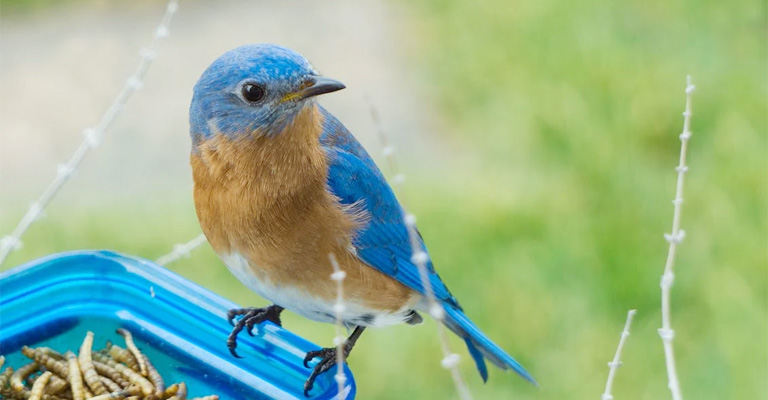
Boredom and lack of mental stimulation can contribute to feather plucking. Provide your bird with a stimulating environment by offering a variety of toys, perches, and activities.
Rotate toys regularly to keep them interesting and engage your bird in interactive playtime to prevent boredom.
Optimize the Diet
A balanced and nutritious diet is crucial for your bird’s overall health and feather condition. Consult your avian veterinarian to determine the appropriate diet for your bird’s species and individual needs.
Ensure they receive a variety of fresh fruits, vegetables, high-quality pellets, and occasionally, appropriate amounts of seeds or nuts. A healthy diet can contribute to better feather quality and reduce the likelihood of plucking.
Identify and Address Stressors
Stress can be a significant factor in feather plucking. Evaluate your bird’s environment for potential stressors, such as loud noises, sudden changes, lack of routine, or conflicts with other pets. Minimize exposure to stressors and create a calm and predictable environment for your bird.
Provide Mental and Physical Stimulation
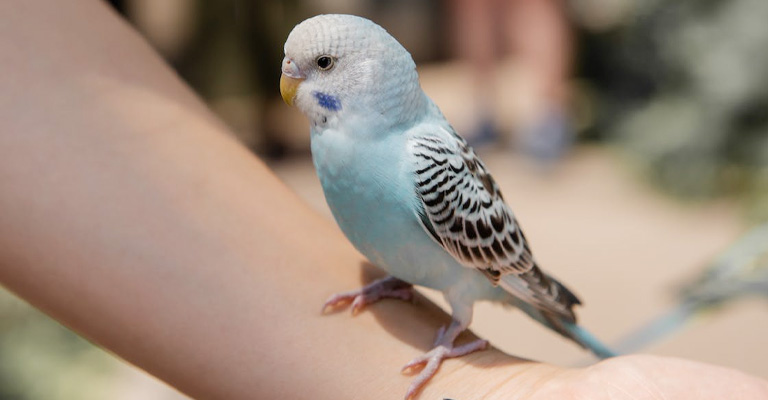
Birds need mental and physical exercise to stay happy and content. Engage your bird in regular out-of-cage time for supervised exploration, flight, and exercise.
Offer opportunities for foraging by hiding treats or food within toys or puzzle feeders to stimulate their natural instincts.
Consider Behavior Modification Techniques
If your bird has developed a habit of plucking, behavior modification techniques may be necessary.
Consult with an avian behaviorist or experienced bird trainer for guidance on positive reinforcement training, desensitization, and counter-conditioning techniques to redirect your bird’s focus away from plucking.
Use Deterrents and Protective Measures
In some cases, physical deterrents such as bitter-tasting sprays or protective devices like Elizabethan collars (E-collars) may be used temporarily to prevent your bird from accessing or damaging its feathers. However, these should only be used under the guidance of a veterinarian or experienced professional.
Seek Emotional Support for Your Bird
Birds are social animals and require companionship. Ensure your bird receives ample social interaction and bonding time with you and, if appropriate for their species, consider providing a suitable avian companion to alleviate loneliness and separation anxiety.
Is plucking feathers a bad thing to do?
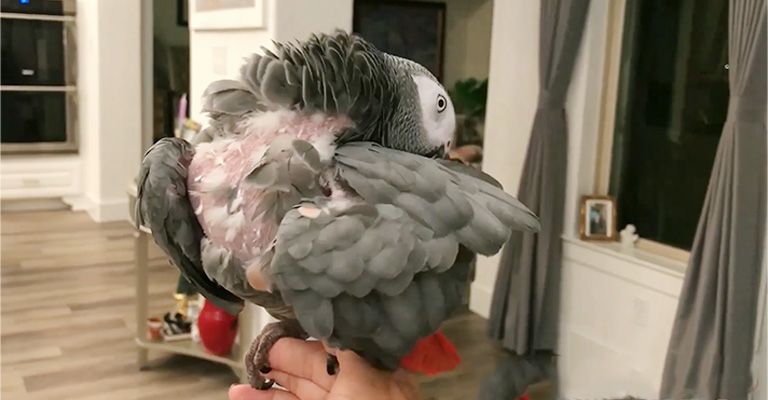
Many wonder if there is any harm in removing feathers. The act of plucking feathers is not inherently wrong in and of itself.
Feather follicles are delicate structures and can become infected or injured under certain conditions. Naturally, the wounds would be terrible if feather plucking developed into a self-mutilation problem.
However, it is critical to understand that the underlying causes of feather plucking are detrimental. In general, feather plucking indicates that your bird is unhappy. Feather-plucking is generally the outcome of a confluence of issues.
To stop your bird from plucking its feathers, you should identify and address the causes of its stress. This is what we mean by the “root cause.” The particular needs of exotic birds are often the root cause of the plucking problems that arise.
Why Does Feather Plucking Happen?
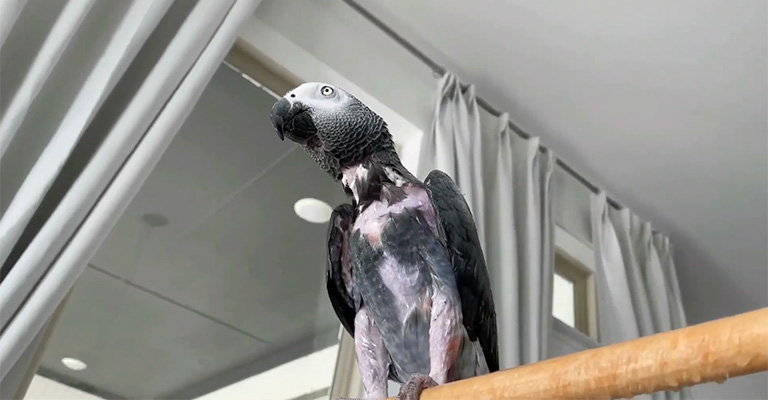
Feather plucking, also known as feather picking or self-mutilation, is a behavior observed in various bird species where they engage in the destructive act of removing their own feathers.
This phenomenon is a complex issue that can have multiple underlying causes. Understanding why feather plucking happens requires considering various factors that contribute to this behavior.
Physical Factors
Feathers serve crucial functions for birds, such as flight, insulation, and attracting mates. Physical discomfort or pain can trigger feather plucking as birds attempt to alleviate their discomfort.
Factors such as skin irritations, allergies, parasites, or infections can lead to itchiness or discomfort, prompting the bird to pluck feathers in an attempt to find relief.
Psychological Factors
Feather plucking can also be a manifestation of psychological distress in birds. Birds are intelligent creatures with complex emotional lives, and they can experience stress, anxiety, boredom, or frustration.
Stressors such as changes in the environment, loss of a mate or companion, lack of mental stimulation, or inadequate social interaction can contribute to the development of feather-plucking behaviors.
Environmental Factors
The bird’s living environment plays a significant role in its overall well-being. Inadequate or inappropriate housing conditions, such as small cages, lack of perches, or limited access to natural light, can cause stress and lead to feather plucking.
Additionally, exposure to toxins, pollutants, or harmful chemicals in the environment can have adverse effects on a bird’s health and trigger this behavior.
Nutritional Factors
Poor nutrition or deficiencies in a bird’s diet can result in feather plucking. Feather development requires essential nutrients, including proteins, vitamins, and minerals.
Inadequate intake of these nutrients can lead to abnormal feather growth, making the feathers prone to damage or discomfort. Birds may engage in feather plucking in an attempt to remove or alleviate these problematic feathers.
Social Factors
Birds are social animals, and social interactions are crucial for their well-being. Loneliness, social isolation, or lack of appropriate socialization with conspecifics or human caregivers can contribute to stress and boredom, potentially leading to feather plucking. A lack of opportunities for mental stimulation, play, and exercise can also exacerbate these issues.
How Do You Rescue A Feather-Plucking Bird From Stress?
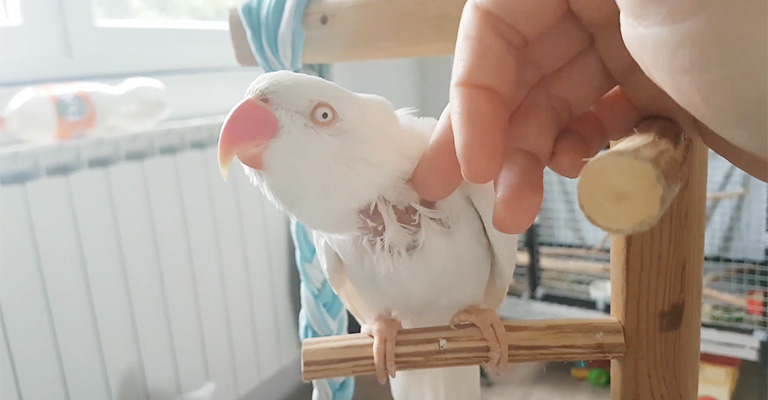
If you want your bird’s feather plucking to stop, I recommend using scientific methods. Using Applied Behaviour Analysis, experts can rank the success of various methods for addressing problematic behaviors in companion birds, such as feather plucking.
Stress is the primary motivating factor in feather picking. Many issues, some major and some easily remedied can contribute to this kind of stress.
These are the most important ones:
Disease
Viruses, bacteria, malignancies, endocrine disorders, and vitamin shortages are all possible underlying causes of feather picking. As a result, if your bird is picking at his feathers, you should take him to the clinic.
Pain
When birds experience pain, they frequently respond inappropriately by plucking at or gnawing the affected area. Disease, injury, or a long-term health issue could all be contributing factors to this suffering.
Behavioural
Feather plucking can be a symptom of boredom, loneliness, or being ignored. This could be the case if your bird is kept isolated in a cage.
Habitat
Your bird’s habitat may be a contributing factor to his feather plucking. A small or overcrowded cage, as well as a lack of natural light or humidity, are all possible causes of this behavior.
Diet
Your bird’s diet has a big impact on his health and is one of the most common reasons for feather plucking. A lack of variety in one’s diet can lead to health problems and even the loss of feathers.
Allergies
Like humans, birds can experience allergies, which manifest as itchy skin and the need to pluck their feathers. Common allergens in grains including wheat, maize, and rice that many birds can’t eat.
Toxins
Your pet bird may not be exposed to the same variety of foreign substances found in the home as it would in the wild. Heavy metal poisoning can occur if your bird ingests certain substances, and other hazards include fumes from the kitchen or cigarettes.
Habitat
Consider placing your bird’s cage in a brighter location and adding a humidifier to increase the humidity. Consider upgrading your bird’s housing to a more spacious cage.
Reduce the number of seeds in your bird’s diet and replace them with a variety of fresh vegetables.
Allergies and Toxins
Track down and eliminate the source of your symptoms. Feed your bird allergen-free feed and keep his cage away from sources of smoke, such as the kitchen. Do not offer your parrot any metal toys, and consider switching him to a cage with non-toxic bars if you suspect he has heavy metal toxicity.
FAQ
Feather plucking can have various underlying causes, including stress, boredom, environmental factors, medical conditions, or behavioral issues. It is crucial to identify the root cause to address the behavior effectively.
Determining the cause of feather plucking requires carefully observing your bird’s environment, social interactions, diet, and overall health. Consulting a veterinarian or an avian behavior specialist can provide valuable insights.
Yes, modifying your bird’s environment can be beneficial. Provide mental and physical stimulation, create a stress-free atmosphere, and offer new toys, perches, and a consistent daily routine to help distract your bird from plucking.
Medical conditions such as skin infections, allergies, parasites, nutritional deficiencies, hormonal imbalances, or pain can contribute to feather plucking. A thorough veterinary examination is essential to rule out any underlying health issues.
Behavior modification techniques such as positive reinforcement, providing alternative activities, and redirecting the bird’s focus can be effective. Working with an avian behavior specialist can guide in implementing these techniques.
Conclusion
As we conclude our exploration of how to stop a bird from plucking its feathers, we embark on a mission of compassion and understanding.
Feather plucking is a complex issue with various underlying causes, and addressing it requires patience, observation, and a multifaceted approach.
By providing a nurturing environment, addressing potential stressors, promoting mental and physical stimulation, and seeking professional advice when needed, we can work towards helping our feathered companions overcome this self-destructive behavior.
Let us advocate for their well-being, empowering them to flourish in a world where feathers remain intact, and their beauty shines through unblemished.
Together, we can guide our birds toward a future filled with vibrant plumage, contentment, and a profound bond between species.